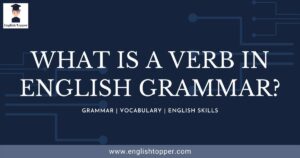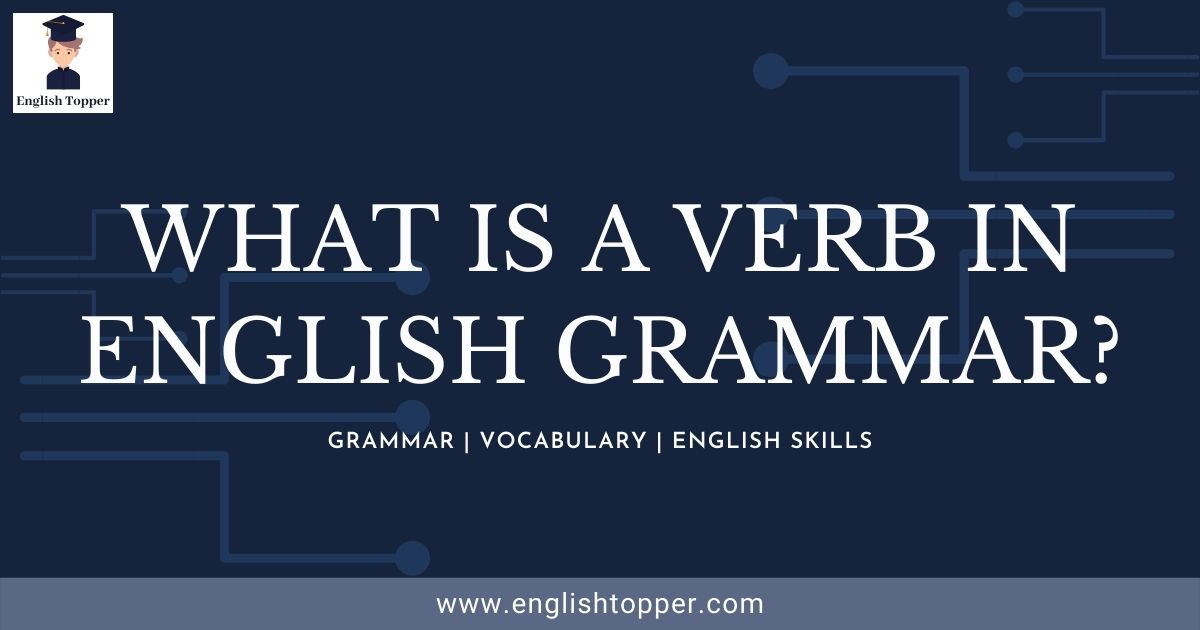Table of Contents
What is Verb in a Sentence?
A Verb is a word which describes the action or state of being of the subject in a sentence. It basically indicates what the Subject performs.
In simple words, it can also be defined as, “the action words”. It belongs to one of the 8 Parts of Speech.
For example, walk, run, jump, slide, talk, sit, write, speak, listen, watch, eat, etc.
The Verb is also called as, “the heart of the Sentence” because it plays an important role in the sentences.
Now let us understand this topic with more examples.
More examples of Verbs
Note: The Blue coloured words are verbs.
- Why are you talking very slowly? (talking – action)
- I am very happy today. (am – state of being)
- I am not going to school today. (am – state of being, going – action)
- Daily, I wake up at 5 am. (wake – action)
- Today, I am planning to watch a film in the theatre. (am – state of being, planning – action, watch – action)
- John works very hard every day to reach his goal. (works – action)
- Shaun is a successful businessman. (is – state of being)
- Rahul accepted the job offer. (accepted – action)
- He runs very fast. (runs – action)
- I am living in India for the past two years.
The basic forms of Verbs
There are 6 basic forms of verbs that are used in the sentences those are,
- Basic Form
- Infinitive
- Past Tense
- Past Participle
- Present Participle
- Gerund
Basic Form
Basic simple words of the verb are called Basic Verb Forms. The examples of this type of form are given below.
- I read books every day.
- I swim every day.
- Children always run here and there.
Infinitive Form
Infinitive Form describes the action which is infinity in nature (anytime it can happen). Here, “to” should be added to the basic form word. For example,
“to” + Basic Form Word = Infinitive Form
- He needs to study well to get good marks.
- She needs to think about her career.
- Sita likes to dance alone.
Past Tense
Past tense verbs describe the action which is already been done before in the past. Most of the Past Tense words have “-ed” at the end.
basic word + “ed” = Past Tense Word
For example,
- I already completed my preparation for tomorrow’s exam.
- I had watched this movie before.
- The boss fired an employee today.
Past Participle
The topic Past Participle is basically similar to Past tense. Here also “-ed” is added at the end like Past tense.
Then you might ask what’s the difference between these two forms?
Both are the same in terms of adding “-ed” to the end of the word.
But the main difference is Past tense expresses the action of the past, and a Past Participle is just a form of a word. It cannot be used alone as a verb in the sentence.
Past Participle is not a tense remember that.
had + verb + “-ed” = Past Participle
For example,
- Simple Past (Wrong): I eaten an apple. (X)
- Simple Past (Correct): I ate an apple. (_/)
- Past Participle: I had eaten an apple. (_/)
You can observe that Past Participle words like eaten, walked, spoken, etc cannot be used alone (1st sentence).
You need to add “had” before the verb/word (3rd sentence).
Past Tense words can be used alone in the sentence but Past Participle cannot.
Present Participle
The verb form of Past Participle describes the action which is continuing at present. We need to add “-ing” to the end of the words (verbs).
verb + “-ing” = Present Participle Form
For example,
- I am writing an article now.
- I am waiting to meet my friend.
- Children are playing football here.
Gerund
The Verb which functions as a noun is known as Gerunds. Here are a few examples of it,
- Meditating every day is good for your body and mind.
- Reading books is a good habit.
- Dancing is my hobby.
We can observe that the words act like nouns in the above sentences.
Now let us understand the different types of verbs.
Different types of Verbs
There are basically 6 types of Verbs in the English Language. Those are,
- Finite Verbs
- Non-finite Verbs
- Action Verbs
- Linking Verbs
- Auxiliary Verbs
- Modal Verbs
Finite Verbs
Finite Verbs are those verbs which describe the action of the Subject in the sentences. These words are actual words (which is also called the root of the sentences).
These verbs use any one of the tenses (depending on the condition of the subject) in the sentences.
For example,
- Tina went to the hospital for her checkup.
- Arvind watches movies every day.
- She is playing tennis.
Remember that these verbs changes according to the Subject. If the Subject performed some action before, then the verb changes its tense to the past.
So, verbs change if the Subject performs an action in the past, present or future (according to the tense).
Non-finite Verbs
Non-finite verbs don’t function as a verb in the sentence, but it works like nouns, adjectives, adverbs, etc.
These are not actual verbs and don’t have a direct relationship with the Subject.
Sometimes these verbs can also function as subjects.
So the basic forms which come under Non – finite verbs are Gerund, infinitive and participle.
- Ram went to a shop to buy groceries. (Infinitive)
- I had already passed this test. (Past Participle)
- Jogging is good for your health. (Gerund)
- We are planning for a Picnic today. (Present Participle)
Action Verbs
Action verbs are those verbs which describe the actions of the Subject. These verbs are classified into two types. Those are,
- Transitive Verbs
- Non – Transitive Verbs
Transitive Verbs are used only when the Object is used in the sentence. That means the action should be done on the object.
For example,
- I played football. (Object – football)
- Sunil is watching TV. (Object – TV)
- I wrote the exam well. (Object – exam)
Whereas Intransitive verbs don’t need an object in the sentence. That means these verbs can be used without objects.
For example,
- I am tired.
- I am having a lot of work.
- She got good marks.
We can observe that the above sentences don’t have any objects.
Linking Verb
Linking verbs describe the action of the Subject by linking it to its complements (more information). These verbs are also called “be verbs”.
Here, Subject complements are the predicate’s noun, adjective, etc which adds more information about the Subject.
A few examples of Linking verbs are am, is, are, was, where, has been, had been, can be, could be, etc.
Below are examples of linking verbs and normal words written in between the brackets.
- She looks beautiful. (She is beautiful)
- Sunil has been living in Paris for a long time. (Sunil is living in Paris for a long time)
- We have been waiting here for an hour. (We are waiting here for an hour)
Auxiliary Verb
The verbs which help (modifies or describe) the main verbs in the sentences are known as Auxiliary Verbs. It is also called “helping verbs”.
These verbs describe the action with reference to the time (whether the action happened in the past, present or future).
For example,
- He had a better career option.
- They did an amazing job.
- Suraj is going to his village next week.
Modal Verbs
Modal verbs are those verbs which indicate the possibility, potentiality, ability, permission, expectation, and obligation.
These verbs are a part of Auxiliary Verbs. A few examples are can, could, should, must, may, will, etc.
The main difference between Auxiliary and Model verbs are,
- Auxiliary verbs are used to indicate tense, mood, etc.
- Models verbs are used to indicate the possibility, etc.
Even though they may look similar, their usage is different.
Now, let us understand the Modal verbs below examples.
- May I come inside?
- Can you elaborate more on this topic?
- You must follow the traffic rules.
Quiz Time! (Test your knowledge here)
#1. Transitive verbs are not used for Objects in the sentences. Is it true or false?
#2. A verb is ______________.
Answer: A verb is an action word.
#3. You should not take any risk. Identify the type of verb used?
Answer: Modal verb is used in the sentence.
#4. Teacher got angry on a student. Identify the verb.
Answer: The word “got” is the verb.
#5. He likes to talk with everyone. Which type of verb form is used? (Hint: to talk)
Answer: Infinitive Form is used. (“to” basic word = IF)
#6. Which type of verbs are actual verbs?
Answer: Finite Verbs are actual verbs.
#7. Gerund is a type of verb which functions like ___________.
Answer: Gerund functions like a noun.
#8. I drink plenty of water. Which form of verb is used for the word "drink"?
Answer: The Basic form of the verb is used.
#9. Auxiliary verbs are also called as ___________.
Answer: Auxiliary verbs are also called as “Helping verbs”.
#10. Where you went yesterday night? Identify the verb.
Answer: The word “went” is the verb.
Results
|
Getting your Trinity Audio player ready...
|
Hurray….. You have passed this test! 🙂
Congratulations on completing the quiz. We are happy that you have understood this topic very well.
If you want to try again, you can start this quiz by refreshing this page.
Otherwise, you can visit the next topic 🙂
|
Getting your Trinity Audio player ready...
|
Oh, sorry about that. You didn’t pass this test! 🙁
Please read the topic carefully and try again.
Summary: (What is Verb in a sentence?)

- Verbs indicate the action of the Subject.
- The different forms of verbs are used depending on the condition.
- Without verbs, the sentence is said to be incomplete.
- There are 6 types of basic forms of verbs.
- Some verbs describe the action with the help of tenses.
If you are interested to learn more, then you can refer to Wikipedia here.
I hope that you understood the topic “What is Verb in a sentence?”. If you have any doubts regarding this topic, comment down below, and we will respond as soon as possible. Thank You.





